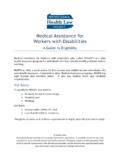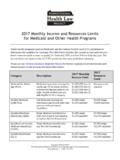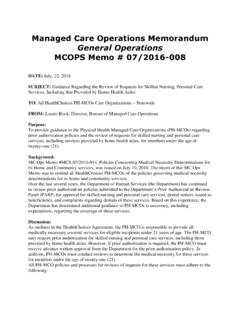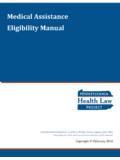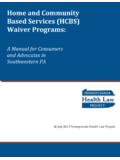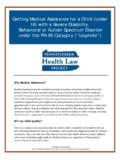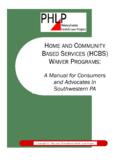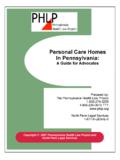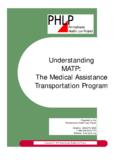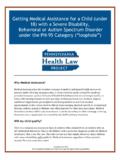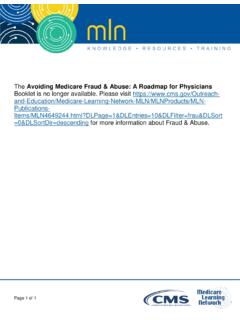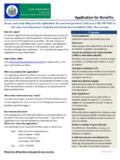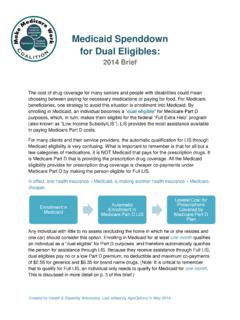Transcription of Health Law PA News
1 Health Law PA news 1 Copyright 2017 Pennsylvania Health Law Project November 2017 In This Issue Health Law PA news A Publication of the Pennsylvania Health Law Project Volume 20, Number 8 November 2017 Statewide Helpline: 800-274-3258 Website: Online at or by emailing PHLP Wins Major Victory in PA Supreme Court On Insurance Coverage of Autism Intervention On October 5, 2017, the Pennsylvania Supreme Court ruled that insurance policies subject to the state s Autism Insurance law (Act 62) must cover Applied Behavioral Analysis ( ABA ) provided in school- even if the policy specifically excludes coverage of any ser-vices provided in school. This capped a seven year legal battle by the Burke family against Independence Blue Cross. The case was heard in Common Pleas Court, Superior Court, the PA Supreme Court, back down to Superior Court and finally back to the PA Supreme Court for the ultimate decision.
2 The Burkes were rep-resented by PHLP at all stages of the litigation. ABA is a group of interventions for individuals on the autism spec-trum. These interventions collectively have the greatest body of evidence of their effectiveness in addressing challenging behaviors and deficits in language and social skills for individuals on the au-tism spectrum. Research published in the October edition of Health Affairs found that state mandates [like PA s Act 62] are an effective tool for broadening access to autism treatment under commercial insurance. Not all insurance policies are subject to Act 62. To find out which policies are subject to Act 62, click here or visit PHLP s website. medicare Open Enrollment Peri-od Underway 2 PHLP Offers medicare 2018 Webi-nar 3 Gov. Wolf Vetoes Bill Imposing Medicaid Work Requirements and Allowing Benefit Cuts 4 CHIP Program in Jeopardy 5 Update on State Budget for 2018 5 Federal Update 6 Many Leadership Changes An-nounced by Wolf Administration 7 CHC Starts January 1st in South-west But Start Delayed for Rest of State 8 CHC Enrollment in Process for Southwest PA 8 SW PA OBRA Waiver Participants Move to CHC 9 Commonwealth Court Rules Against United in CHC Appeal 10 Update on Physical HealthChoic-es Contracts 10 Affordable Plans still Available on 11 Major Changes to the PFDS & Consolidated Waivers 12 Health Law PA news 2 Copyright 2017 Pennsylvania Health Law Project November 2017 medicare Open Enrollment Period Underway medicare s Annual Open Enrollment Period started October 15th and ends
3 December 7th. During this period, all medicare beneficiaries can change their Health or their drug plan coverage. Changes made during the period start on January 1, 2018. Beneficiaries already enrolled in a medicare Prescription Drug Plan or medicare Advantage Plan should have received information from their current plan about what the benefits and costs will be in 2018. Everyone is encouraged to review this information to decide whether to stay with their cur-rent plan or join a new plan for next year. Information about 2018 medicare Prescription Drug Plans and medicare Advantage Plans is available on Pennsylvanians continue to have many options for Health and drug coverage in 2018. APPRISE staff and volunteers can help people across Pennsylvania review their 2018 Medi-care coverage options. People wanting their help can call 1-800-783-7067.
4 Stand-Alone Prescription Drug Plans: There are 26 stand-alone drug plans available across Penn-sylvania for enrollment in 2018. Premiums for these plans range from $ to $ per month. There are still nine plans to choose from that are zero-premium for individuals who qualify for the Full Extra Help (click here for the 2018 list). However, there are two notable changes to this list be-tween this year and next -- the AARP MedicareRx Saver Plus plan will no longer be zero-premium in 2018 and Basic Blue Rx is a new plan added to this list for next year. Individuals wanting to change their stand-alone prescription drug plan should consider the plan s costs, list of covered drugs, and pharmacy network. We detailed the 2018 Part D costs in our previous newsletter, including how much people with the Extra Help will pay for Part D in 2018.
5 medicare Advantage Plans: Residents in every county in Pennsylvania continue to have many medicare Advantage Plans to choose from. Lancaster County has the most (48) medicare Advantage Plans and Pike County has the fewest Plans (9). These numbers do not include medicare Special Needs Plans that limit their enrollment to certain groups of medicare beneficiaries: dual eligibles, people in nursing homes, and people with certain chronic conditions. Most, but not all, of the medicare Advantage Plans available include drug coverage. Individuals con-sidering a medicare Advantage plan for 2018 should check the plan s costs, benefits, provider net-work and pharmacy network, list of covered drugs, and any extra benefits offered such as dental or vision care. Special Needs Plans for Dual Eligibles (D-SNPs): These plans only enroll medicare beneficiaries who also have Medicaid (dual eligibles).
6 In 2018, all counties in Pennsylvania will have at least one D-SNP available except for Pike and Franklin counties who have no D-SNP plans. All current D-SNPs Health Law PA news 3 Copyright 2017 Pennsylvania Health Law Project November 2017 will continue to operate in 2018 and some plans such as AmeriHealth Caritas VIP Care and UPMC for Life Dual are expanding into parts of PA where they had not been previously offered. A new D-SNP, Allwell Dual medicare from PA Health & Wellness, will be available in a number of counties across Pennsylvania. Click here for the listing of D-SNPs by county for 2018. Individuals interested in joining or changing their D-SNP in 2018 should consider the plan s provider and pharmacy network, their list of covered drugs, and extra benefits offered. They should also consid-er the plan s costs; however, since most dual eligibles joining D-SNPs have full Medicaid as their second-ary insurance, their out of pocket costs for Health care should be limited to the small Medicaid co-pay that applies to the service received (never more than $4).
7 medicare and Community HealthChoices As a reminder, dual eligibles moving to Community HealthChoices (CHC) will continue to have Medi-care as their primary coverage. Their move to CHC is only changing their secondary Medicaid coverage. Dual eligibles continue to have all the medicare plan choices noted above. If a dual eligible is happy with her current medicare coverage, she can stay put with the coverage she has; but, she will still need to enroll in a CHC plan for her Medicaid coverage (see pages 8 and 9). The state has created a new fact sheet, Will CHC Affect My medicare ? available to view at Even when dual eligibles are enrolled in a medicare D-SNP, Medicaid is still their second, separate insurance coverage. For those in Southwestern PA moving to Community HealthChoices on January 1, 2018, each insurance company offering a CHC plan will also offer a medicare D-SNP.
8 However, consum-ers are not required to enroll in the medicare D-SNP that is offered by the same insurance com-pany as their CHC plan. Individuals in Southwest PA who need more help understanding how CHC will work with their Medi-care coverage next year are encouraged to contact PHLP s Helpline at 1-800-274-3258. PHLP Offers medicare 2018 Webinar PHLP is offering a free webinar to educate advocates, providers, and professionals who work with dual eligibles and other low-income medicare beneficiaries about medicare in 2018. Dual eligibles are people that get coverage through both medicare and Medicaid. The webinar will be held December 6th from 10am-noon. It will cover the following topics: medicare Part D plans and costs in 2018 Programs that help medicare beneficiaries with their costs Health Law PA news 4 Copyright 2017 Pennsylvania Health Law Project November 2017 Community HealthChoices-impact on dual eligibles What s ahead for medicare To register for the webinar, please click here.
9 Space is limited, so register today! We ask individuals who are registering from the same organization to gather around one computer when possible. This will help to ensure that space is available for all those who are interested in participating. Please share this announcement with others who may be interested in the webinar! Gov. Wolf Vetoes Bill Imposing Medicaid Work Requirements and Allowing Benefit Cuts On October 9th, Governor Wolf vetoed a bill passed by the General Assembly that sought to impose work requirements for many of the state s Medicaid recipients. Among other things, House Bill 59 would have amended the Human Services Code to require the Department of Human Services (DHS) to seek a federal waiver allowing the state to impose employment and job search requirements as a condition of Medicaid eligibility for non-elderly, non-disabled adults.
10 The bill would have also re-quired DHS to seek federal permission to cut nonessential benefits (such as dental care, clinic-based mental Health services, and non-emergency medical transportation) and seek additional bene-fit cuts prior to making any supplemental funding requests. These controversial additions to House Bill 59 had been included without public hearings or debate. In vetoing House Bill 59, Governor Wolf released the following message: This legislation does not promote Health coverage, access and treatment for our seniors, individ-uals with disabilities and individuals suffering from a substance use disorder. Instead, this legis-lation increases costs, creates unnecessary delays and confusion, penalizes individuals who need healthcare, and terminates Health coverage for those who need it most.
